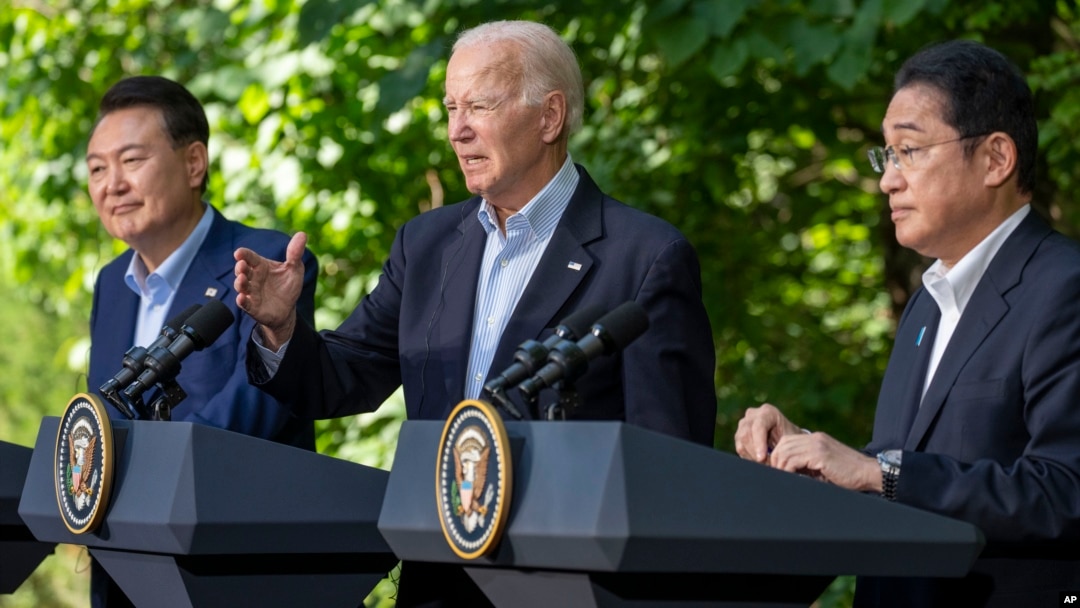The Camp David trilateral security agreement between the United States, Japan and South Korea is likely to drive Beijing to be more aggressive in the South China Sea, analysts say.
The trilateral summit, the first stand-alone gathering of leaders from the three countries, yielded security measures aimed directly at what the participants described in a joint statement as China's "dangerous and aggressive behavior," especially in the South China Sea.
The agreement calls for the three allies to commit to consult with each other to coordinate their response to regional threats.
It also requires them to expand joint military drills and hold annual talks. In a statement, the three countries called out China for "dangerous and aggressive behavior supporting unlawful maritime claims" in what appeared to be a rebuke of China's aggression in the South China Sea.
Clint Work, a fellow and director of academic affairs at the Korea Economic Institute of America, told VOA Korean in an interview that direct mentions of China's behavior in the South China Sea and its claims had not appeared in previous U.S.-South Korea statements.
"To mention all these specific Chinese behaviors and claims is a new development. And to have it in a trilateral document is notable," he said.
China's protest
Beijing expressed deep displeasure with the summit.
Chinese Foreign Ministry spokesperson Wang Wenbin called the meeting "an act of gross interference in China's internal affairs, a deliberate attempt to sow discord" between Beijing and its neighbors.
The spokesperson also rejected criticism of Beijing’s behavior in the South China Sea.
"The U.S., together with its allies, frequently conducted military exercises and close-in reconnaissance in waters around China, including the South China Sea, to flex muscle and intensify tensions in the region," the spokesperson said at a news briefing on Monday.
'Salami-slicing approach'
Analysts say the trio's military exercises and increased ballistic missile cooperation in the Indo-Pacific region will likely push China to strengthen its existing aggressive approach in the disputed waters.
"China will stage its own military exercises in response, perpetuating the action-reaction cycle," said Carl Thayer, professor emeritus of politics at the University of New South Wales Canberra, in an email to VOA Khmer.
Thayer added that although the trilateral partnership on ballistic missiles is mainly directed at North Korea, "the greater interoperability and proficiency in ballistic missile defense" resulting from the partnership will offset the threat posed by China's ballistic missiles.
"China's response will be to improve its offensive capabilities and increase the number of ballistic missiles it can deploy," he said.
John Ciorciari, professor of research and policy engagement at the University of Michigan, said in an email to VOA Khmer that in the short term, China will likely act assertively to show that closer cooperation among South Korea, Japan and the U.S. is counterproductive, but in the long term, "the stronger trilateral cooperation is likely to induce more caution in Beijing."
"China is not likely to engage in dramatic military escalation, but it will probably take economic measures to punish South Korea and Japan. This could accelerate economic decoupling," Ciorciari said.
"China will likely continue pursuing its salami-slicing approach in the South China Sea, building steadily without escalating to major-power armed conflict," he added.
Sweeping maritime claims
China has made sweeping claims to sovereignty over most of the South China Sea, a combined area estimated to hold 11 billion barrels of untapped oil and 190 trillion cubic feet of natural gas.
The claims have angered competing claimants, including Brunei, Indonesia, Malaysia, the Philippines, Taiwan and Vietnam.
In July 2016, an international tribunal in The Hague ruled against China in a claim brought by the Philippines under the United Nations Convention on the Law of the Sea.
China, despite being a signatory to the treaty that established the tribunal, refused to accept the court's ruling.
China has been increasingly aggressive in asserting its claim, using naval presence and exercises to deter opponents from inside and outside the region, and carefully conducting gray zone operations — offensive tactics below the use of armed force by its coast guard, maritime militia and fishing vessels — to harass and intimidate littoral states.
Beijing is also constructing what appears to be an airstrip on Triton Island, a contested territory that is also claimed by Vietnam and Taiwan.
SEE ALSO: China Appears to be Building an Airstrip on a Disputed South China Sea IslandRecently, the Philippine Coast Guard released a video showing a China Coast Guard vessel firing a water cannon at one of its ships.
SEE ALSO: Philippines Summons Chinese Ambassador Over Water Cannon IncidentThe United States has no territorial claim over the contested waters but has asserted that freedom of navigation and flight, as well as peacefully resolving disputes, are in its national interest.
VOA's Korean Service contributed to this report.


